Charles E W Bean, Diaries, AWM38 3DRL 606/254/1 - 1917 - 1933 - Part 15
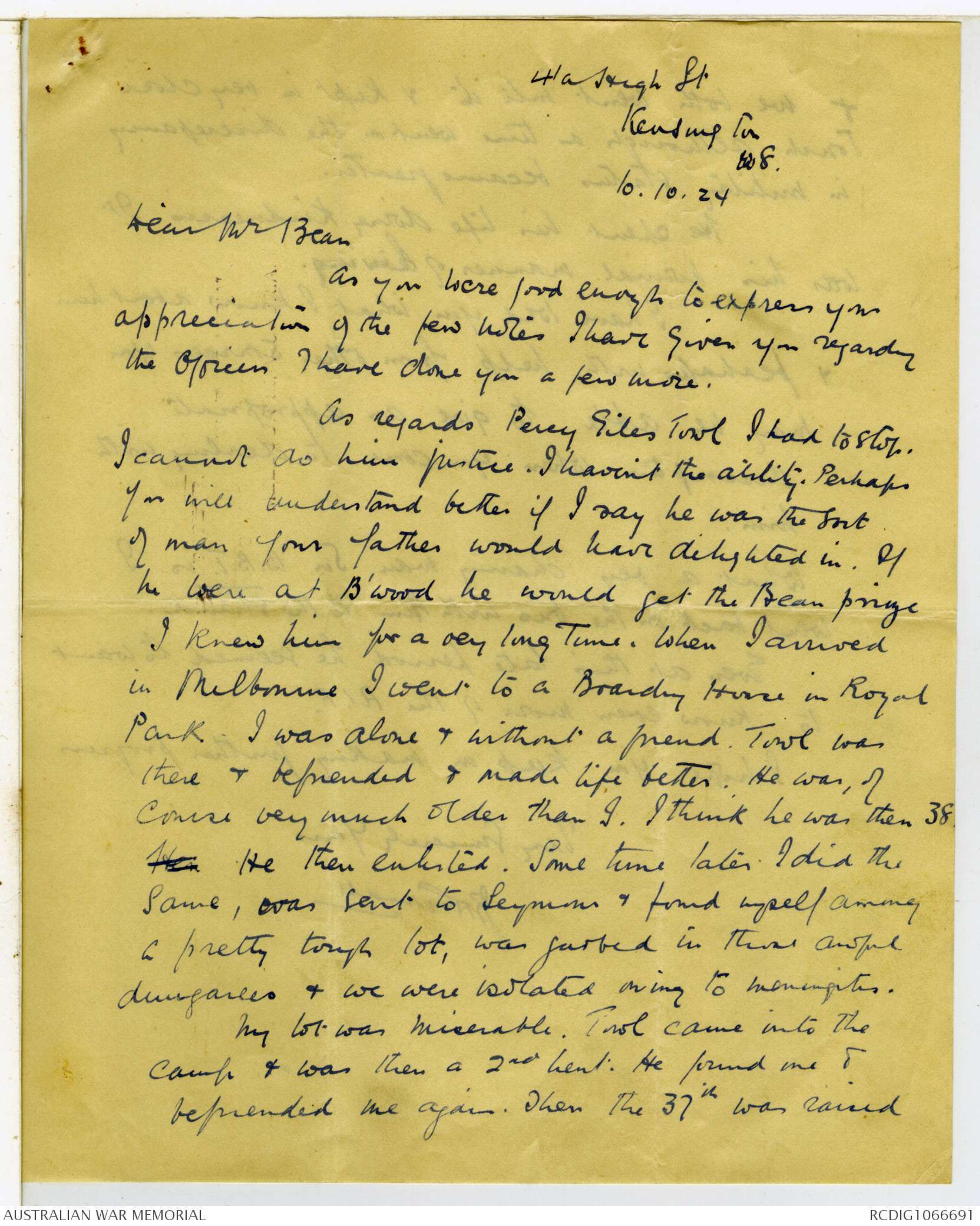
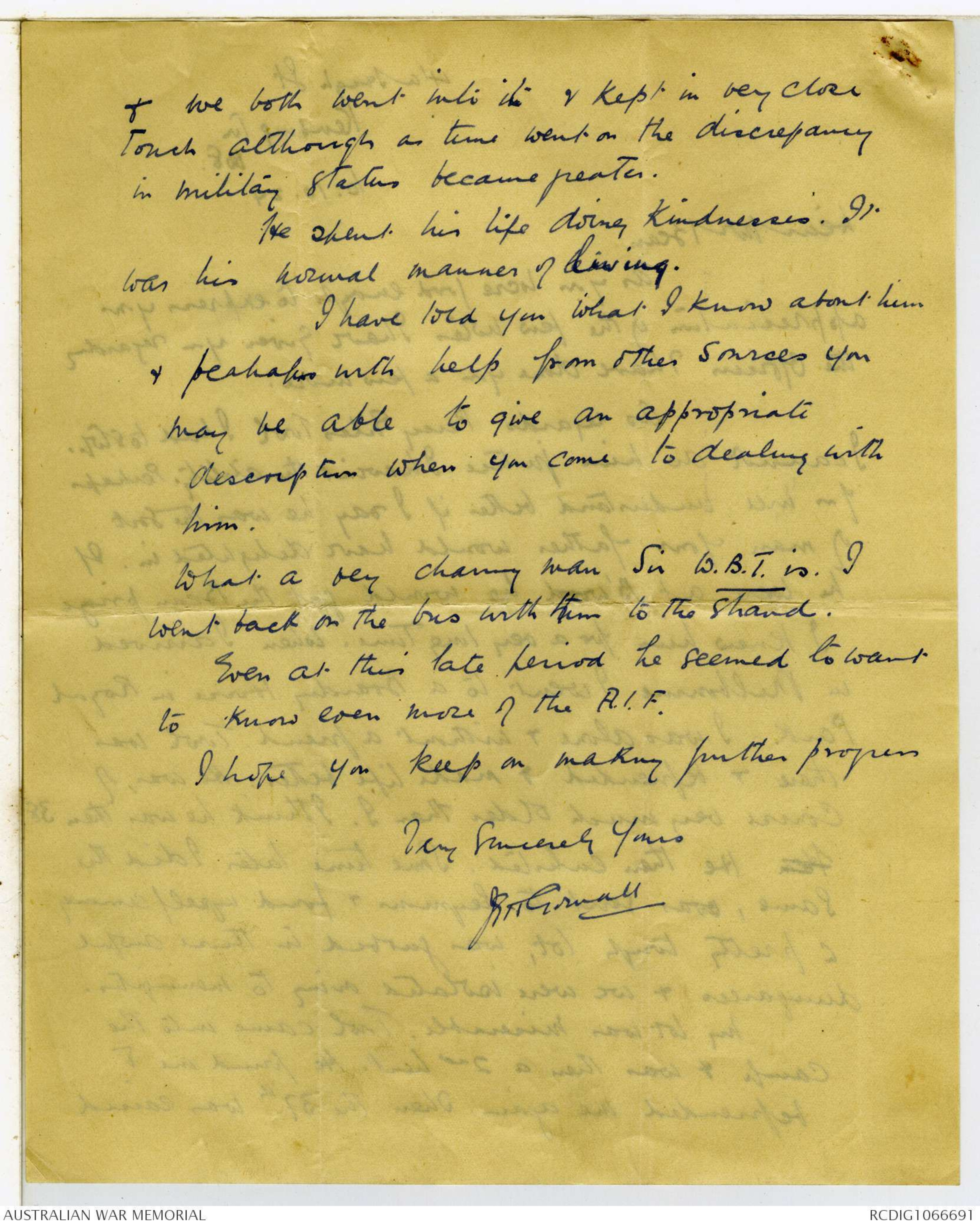
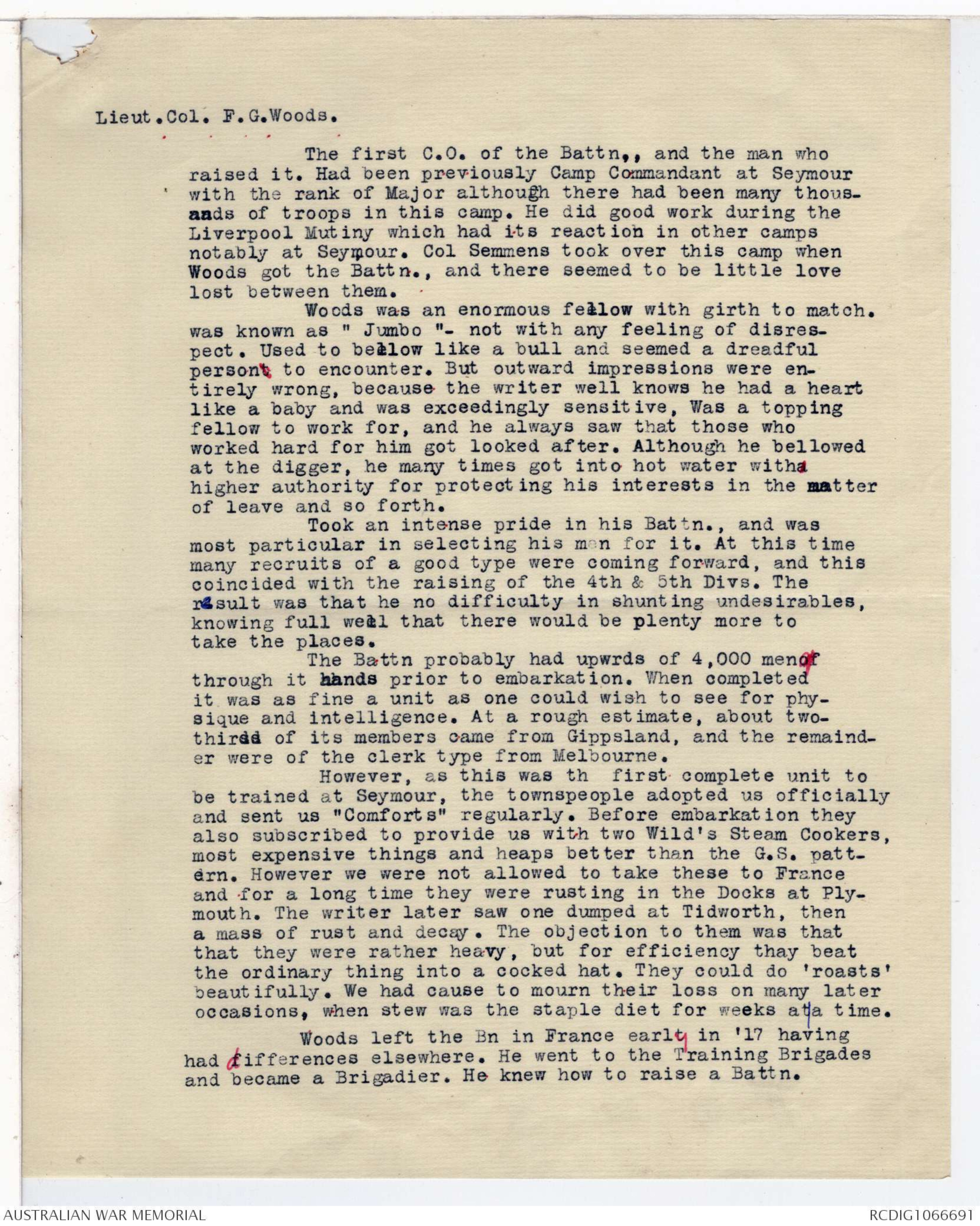
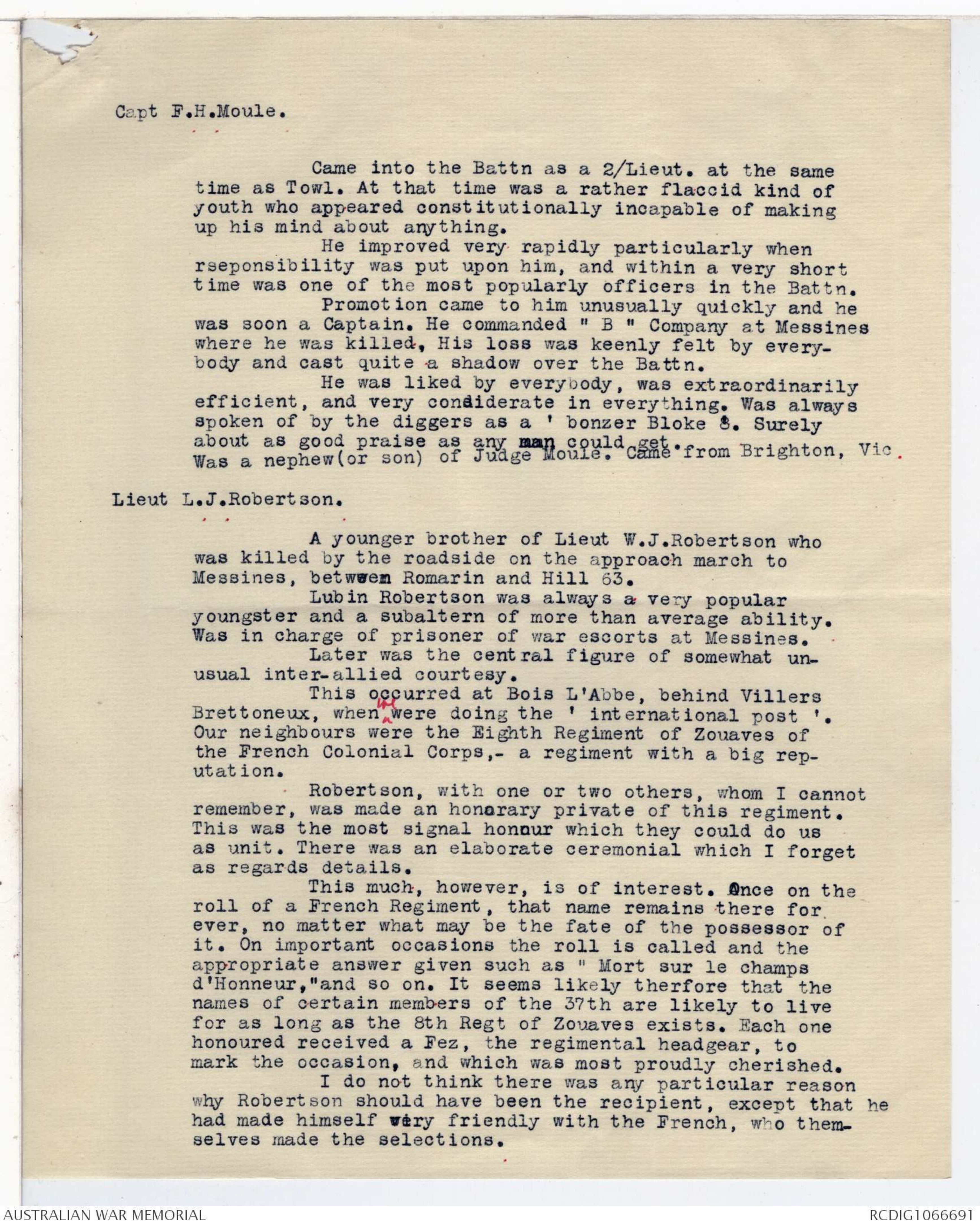
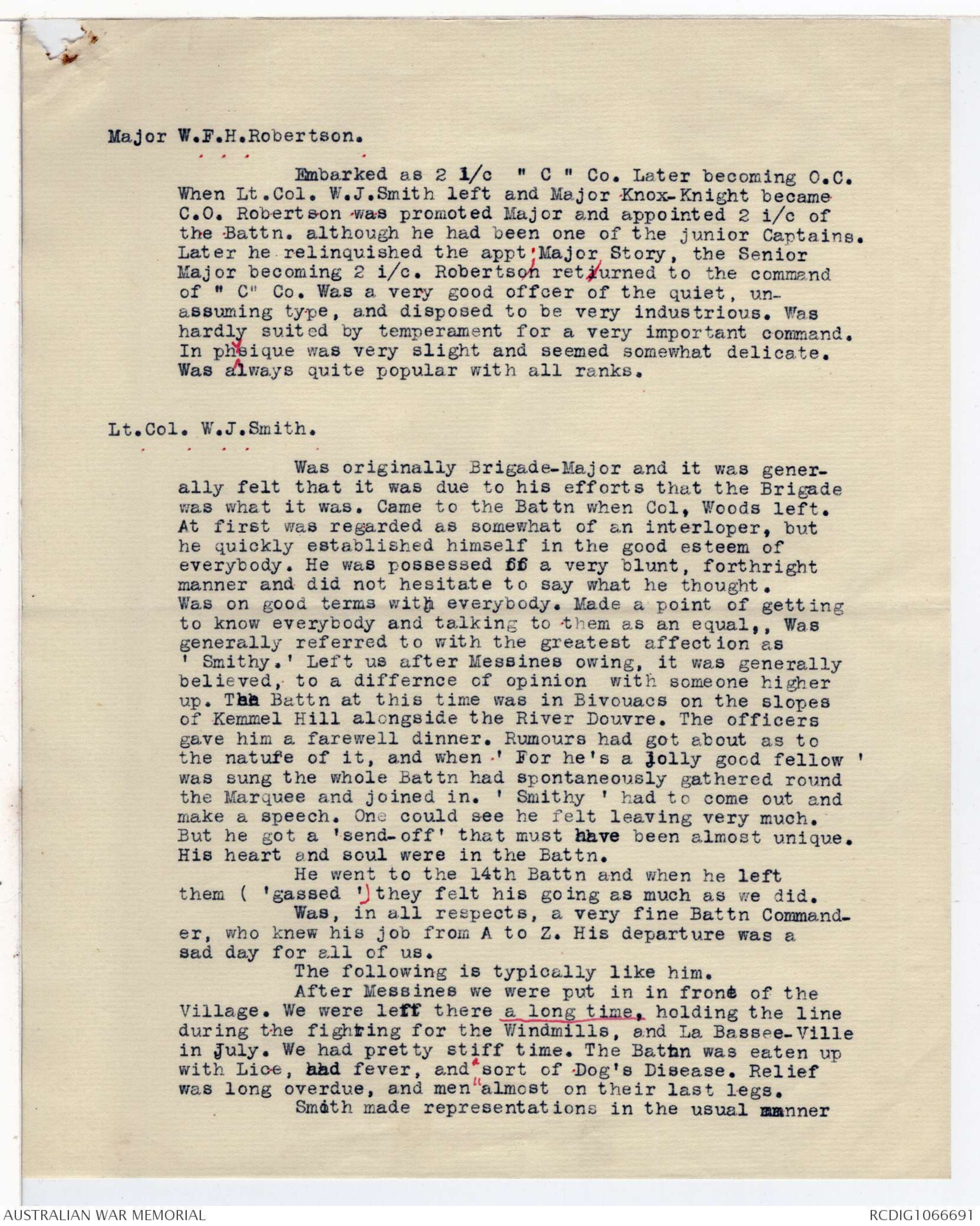
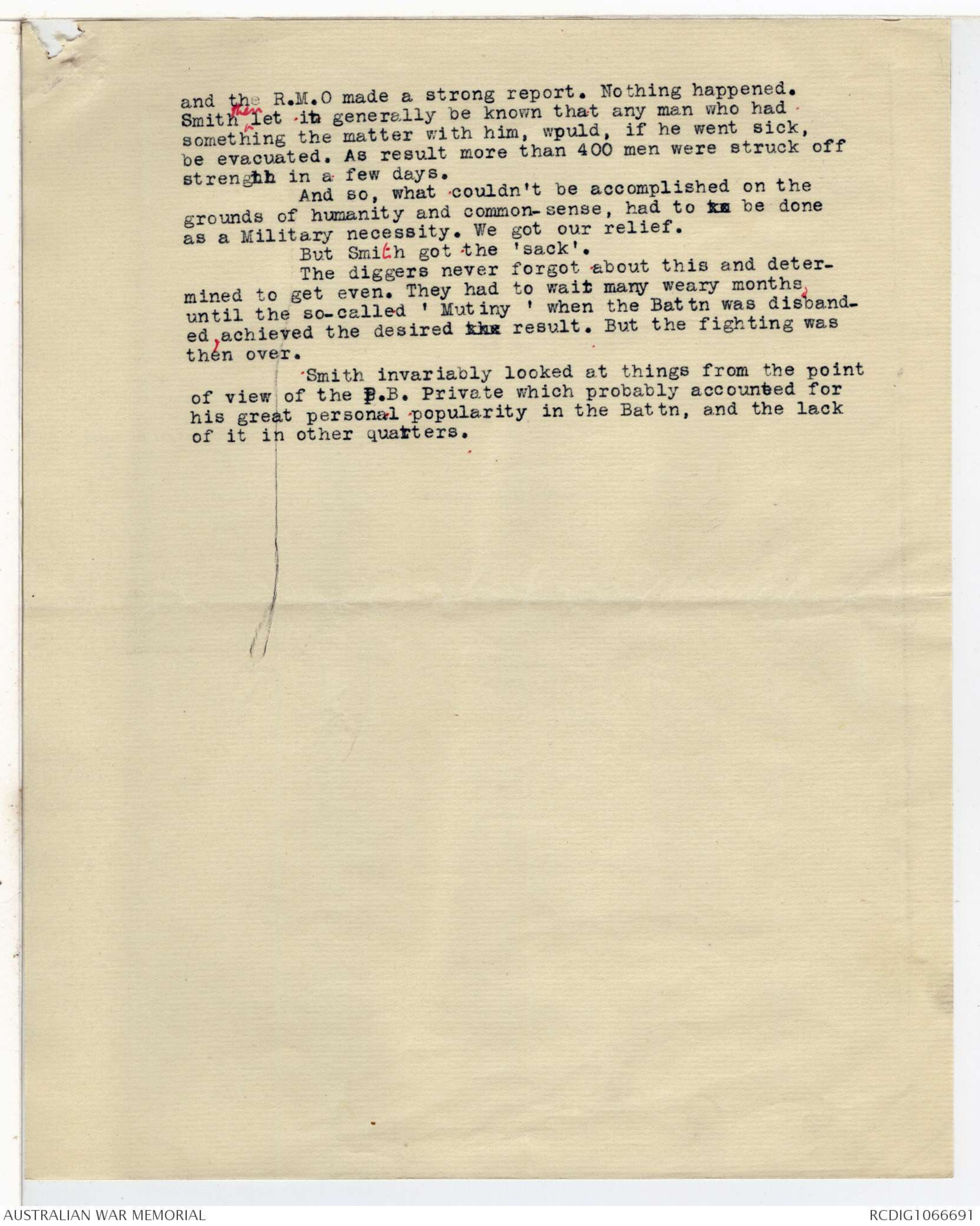
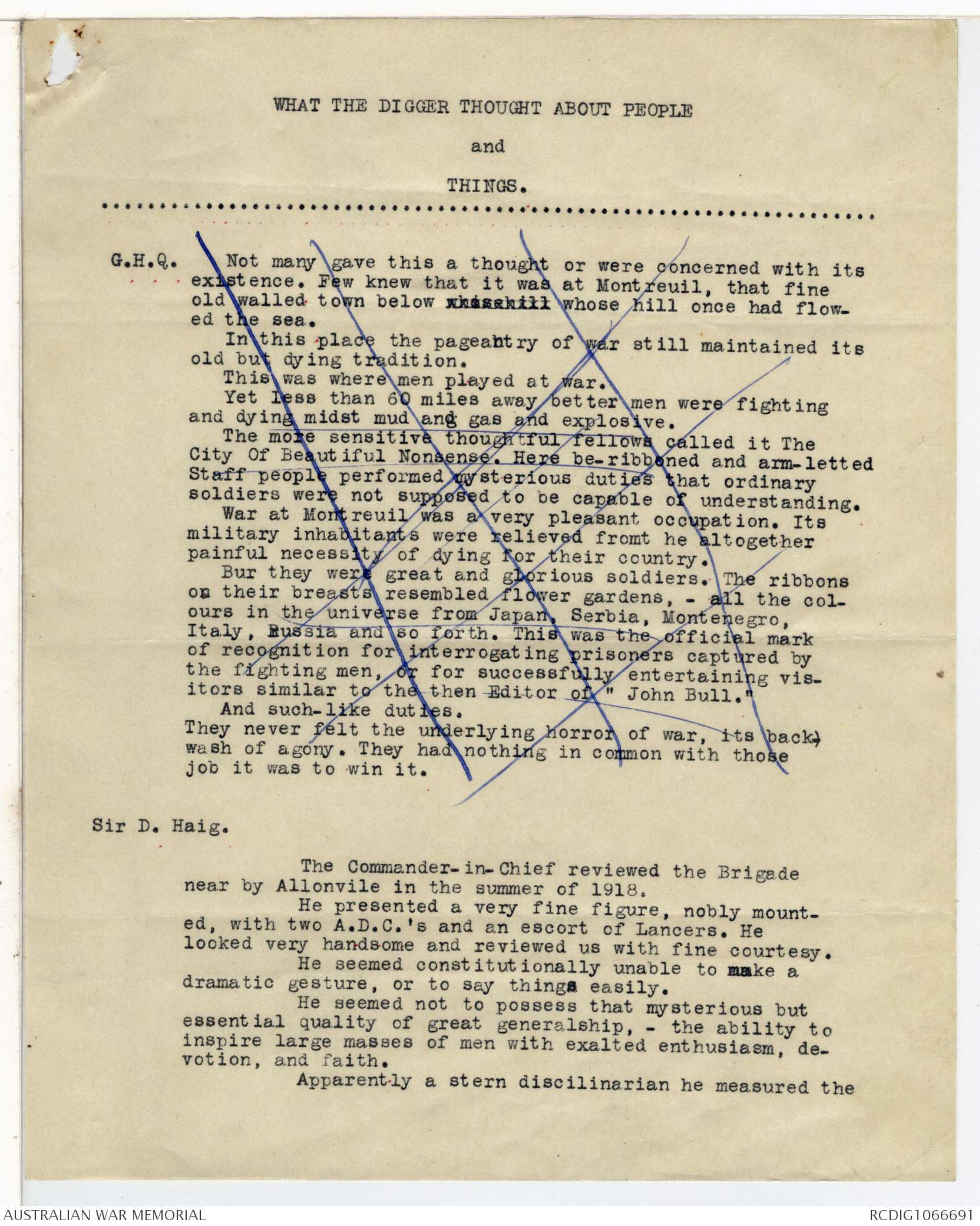
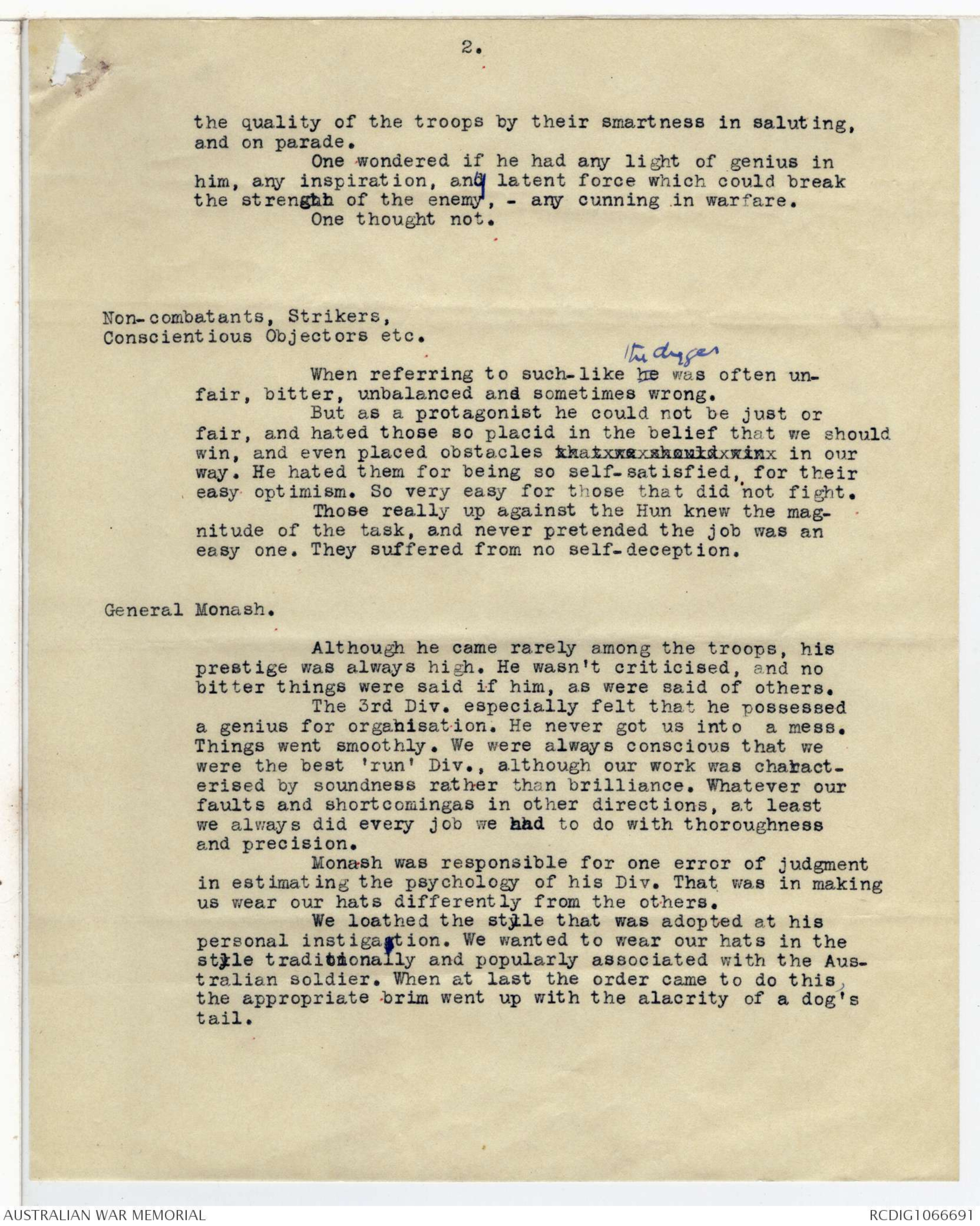
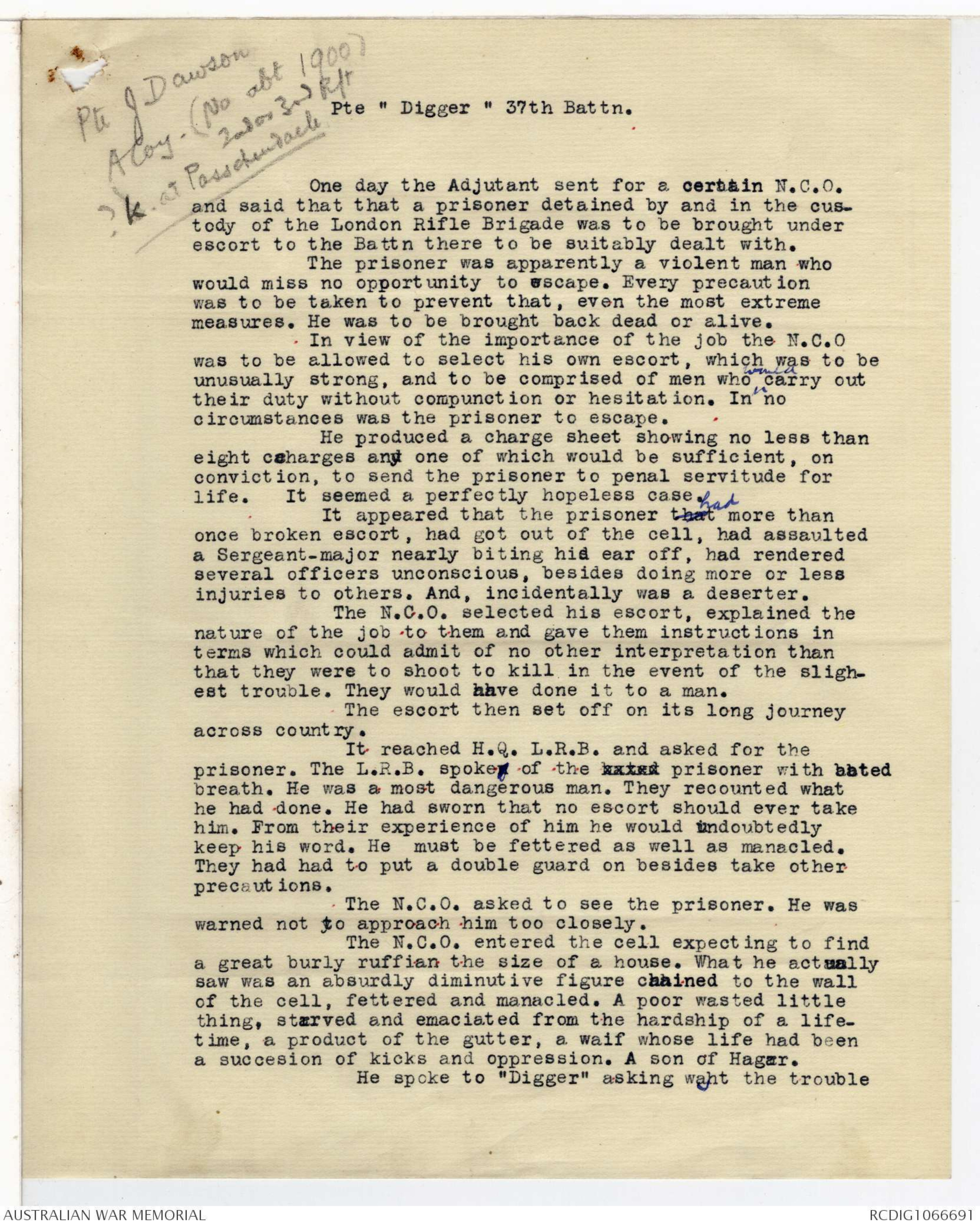
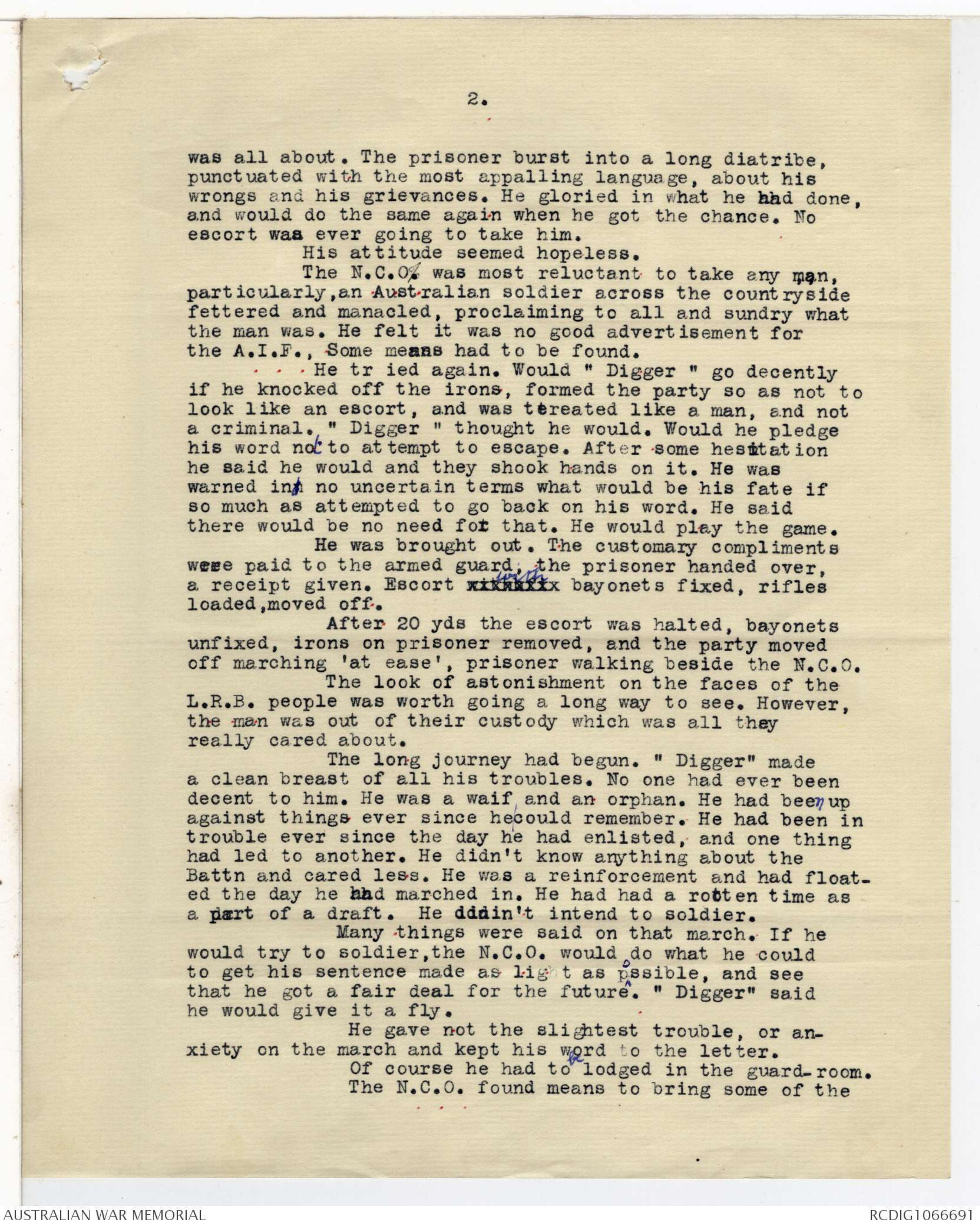
4a High St
Kensington
W8.
10.10.24
Dear Mr Bean
As you were good enough to express your
appreciation of the few notes I have given you regarding
the Officers I have done you a few more.
As regards Percy Giles Towl I had to stop.
I cannot do him justice. I haven't the ability. Perhaps
you will understand better if I say he was the sort
of man your father would have delighted in. I
he were at B'wood he would get the Bean prize
I knew him for a very long time. When I arrived
in Melbourne I went to a Boarding House in Royal
Park. I was alone & without a friend. Towl was
there & befriended & made life better. He was, of
course very much older than I. I think he was then 38Hen He then enlisted. Some time later I did the
same, was sent to Seymour & found myself among
a pretty tough lot, was garbed in those awful
dungarees & we were isolated owing to meningitis.
My lot was miserable. Towl came into the
camp & was then a 2nd Leut. He found me &
befriended me again. Then the 37th was raised
we both went into its & kept in very close
touch although as time went on the discrepancy
in military status became greater.
He spent his life doing kindnesses. It
was his normal manner of living.
I have told you what I know about him
& perhaps with help from other sources you
may be able to give an appropriate
description when you come to dealing with
him.
What a vey charming man Sir W.B.T. is. I
went back on the bus with him to the Strand.
Even at this late period he seemed to want
to know even more of the A.I.F.
I hope you keep on making further progress
Very Sincerely Yours
[[JGH Gruall]]
Lieut.Col. F. G.Woods.
The first C.O. of the Battn,, and the man who
raised it. Had been previously Camp Commandant at Seymour
with the rank of Major although there had been many thousands
of troops in this camp. He did good work during the
Liverpool Mutiny which had its reaction in other camps
notably at Seymour. Col Semmens took over this camp when
Woods got the Battn., and there seemed to be little love
lost between them.
Woods was an enormous fealow with girth to match.
was known as "Jumbo" - not with any feeling of disrespect.
Used to bellow like a bull and seemed a dreadful
persons to encounter. But outward impressions were
entirely wrong, because the writer well knows he had a heart
like a baby and was exceedingly sensitive, Was a topping
fellow to work for, and he always saw that those who
worked hard for him got looked after. Although he bellowed
at the digger, he many times got into hot water withd
higher authority for protecting his interests in the matter
of leave and so forth.
Took an intense pride in his Battn., and was
most particular in selecting his men for it. At this time
many recruits of a good type were coming forward, and this
coincided with the raising of the 4th & 5th Divs. The
result was that he no difficulty in shunting undesirables,
knowing full well that there would be plenty more to
take the places.
The Battn probably had upwrds of 4,000 menof
through it hands prior to embarkation. When completed
it was as fine a unit as one could wish to see for physique a
nd intelligence. At a rough estimate, about two-
thirds of its members came from Gippsland, and the remainder
were of the clerk type from Melbourne.
However, as this was th first complete unit to
be trained at Seymour, the townspeople adopted us officially
and sent us "Comforts" regularly. Before embarkation they
also subscribed to provide us with two Wild's Steam Cookers,
most expensive things and heaps better than the G.S. pattern.
However we were not allowed to take these to France
and for a long time they were rusting in the Docks at
Plymouth. The writer later saw one dumped at Tidworth, then
a mass of rust and decay. The objection to them was that
that they were rather heavy, but for efficiency thay beat
the ordinary thing into a cocked hat. They could do roasts
beautifully. We had cause to mourn their loss on many later
occasions, when stew was the staple diet for weeks at/a time,
Woods left the Bn in France early in 17 having
had differences elsewhere. He went to the Training Brigades
and became a Brigadier. He knew how to raise a Battn.
Capt F.H.Moule.
Came into the Battn as a 2/Lieut. at the same
time as Towl. At that time was a rather flaccid kind of
youth who appeared constitutionally incapable of making
up his mind about anything.
He improved very rapidly particularly when
rseponsibility was put upon him, and within a very short
time was one of the most popularly officers in the Battn.
Promotion came to him unusually quickly and he
was soon a Captain. He commanded "B" Company at Messines
where he was killed, His loss was keenly felt by everybody
and cast quite a shadow over the Battn.
He was liked by everybody, was extraordinarily
efficient, and very considerate in everything. Was always
spoken of by the diggers as a 'bonzer Bloke' S. Surely
about as good praise as any may could get.
Was a nephew (or son) of Judge Moule. Came from Brighton, Vic.
Lieut L.J.Robertson.
A younger brother of Lieut W.J.Robertson who
was killed by the roadside on the approach march to
Messines, between Romarin and Hill 63.
Lubin Robertson was always a very popular
youngster and a subaltern of more than average ability.
Was in charge of prisoner of war escorts at Messines.
Later was the cent ral figure of somewhat unusual
inter-allied courtesy.
This occurred at Bois L'Abbe, behind Villers
Brettoneux, when ^we were doing the 'international post'.
Our neighbours were the Eighth Regiment of Zouaves of
the French Colonial Corps,- a regiment with a big reputation.
Robertson, with one or two others, whom I cannot
remember, was made an honarary private of this regiment.
This was the most signal honour which they could do us
as unit. There was an elaborate ceremonial which I forget
as regards details.
This much, however, is of interest. Once on the
roll of a French Regiment, that name remains there for
ever, no matter what may be the fate of the possessor of
it. On important occasions the roll is called and the
appropriate answer given such as "Mort sur le champs
d'Honneur," and so on. It seems likely therfore that the
names of certain members of the 37th are likely to live
for as long as the 8th Regt of Zouaves exists. Each one
honoured received a Fez, the regimental headgear, to
mark the occasion, and which was most proudly cherished.
I do not think there was any particular reason
why Robertson should have been the recipient, except that
had made himself wary friendly with the French, who themselves made the selections.
Major W.F.H.Robertson.
Embarked as 2 i/c "C" Co. Later becoming O.C.
When Lt. Col. W.J. Smith left and Major Knox-Knight became
C.O. Robertson was promoted Major and appointed 2 i/c of
the Battn. although he had been one of the junior Captains.
Later he relinquished the appt; Major Story, the Senior
Major becoming 2 i/c. Robertson retiurned to the command
of "C" Co. Was a very good offcer of the quiet, unassuming
type, and disposed to be very industrious. Was
hardly suited by temperament for a very important command.
In ph^ysique was very slight and seemed somewhat delicate.
Was always quite popular with all ranks.
Lt.Col. W.J.Smith.
Was originally Brigade-Major and it was generally
felt that it was due to his efforts that the Brigade
was what it was. Came to the Battn when Col, Woods left.
At first was regarded as somewhat of an interloper, but
he quickly established himself in the good esteem of
everybody. He was possessed 66 a very blunt, forthright
manner and did not hesitate to say what he thought.
Was on good terms with everybody. Made a point of getting
to know everybody and talking to them as an equal,. Was
generally referred to with the greatest affection as
'Smithy.' Left us after Messines owing, it was generally
believed, to a differnce of opinion with someone higher
up. The Battn at this time was in Bivouacs on the slopes
of Kemmel Hill alongside the River Douvre. The officers
gave him a farewell dinner. Rumours had got about as to
the nature of it, and when 'For he's a Jolly good fellow'
was sung the whole Battn had spontaneously gathered round
the Marquee and joined in. 'Smithy' had to come out and
make a speech. One could see he felt leaving very much.
But he got a 'send-off' that must have been almost unique.
His heart and soul were in the Battn.
He went to the 14th Battn and when he left
them ('gassed') they felt his going as much as we did.
Was, in all respects, a very fine Battn Commander,
who knew his job from A to Z. His departure was a
sad day for all of us.
The following is typically like him.
After Messines we were put in in front of the
Village. We were left there a long time, holding the line
during the fighting for the Windmills, and La Bassee-Ville
in July. We had pretty stiff time. The Battn was eaten up
with Lice, had fever, and a sort of Dog's Disease. Relief
was long overdue, and men "almost on their last legs.
Smith made representations in the usual manner
and the R.M.O made a strong report. Nothing happened.
Smith let it generally be known that any man who had
something the matter with him, would, if he went sick
be evacuated. As result more than 400 men were struck off
strength in a few days.
And so, what couldn't be accomplished on the
grounds of humanity and common-sense, had to ks be done
as a Military necessity. We got our relief.
But Smith got the 'sack'.
The diggers never forgot about this and determined
to get even. They had to wait many weary months,
until the so-called 'Mutiny' when the Battn was disbanded,
achieved the desired the result. But the fighting was
then over.
Smith invariably looked at things from the point
of view of the P.B. Private which probably accounted for
his great personal popularity in the Battn, and the lack
of it in other quarters.
WHAT THE DIGGER THOUGHT ABOUT PEOPLE
and
THINGS.
G.H.Q. Not many gave this a thought or were concerned with its
existence. Few knew that it was at Montreuil, that fine
old walled town below whaask whose hill once had flowed
the sea.
In this place the pageantry of war still maintained its
old but dying tradition.
This was where men played at war.
Yet less than 60 miles away better men were fighting
and dying midst mud and gas and explosive.
The more sensitive thoughtful fellows called it The
City of BeautIful Nonsense. Here beribboned and arm-letted
Staff peoply performed mysterious duties that ordinary
soldiers were not supposed to be capable of understanding.
War at Montreuil was a very pleasant occupation. Its
military inhabitapts were relieved from the altogether
painful necessity of dying for their country.
Bur they wery great and glorious soldiers. The ribbons
on their breasts resembled flower gardens, - all the colours
in the universe from Japan, Serbia, Montenegro,
Italy, Russia and so forth. This was the official mark
of recognition for interrogating prisoners captured by
the fighting men, by for successfully entertaininy visitors
similar to the then Editoreft "John Bull."
And such-like duties.
They never feit the underlying horror of war, its back)
wash of agony. They had nothing in common with those
job it was to win it.
Sir D. Haig.
The Commander-in-Chief reviewed the Brigade
near by Allonvile in the summer of 1918.
He presented a very fine figure, nobly mounted,
with two A.D.C.'s and an escort of Lancers. He
looked very handsome and reviewed us with fine courtesy,
He seemed constitutionally unable to make a
dramatic gesture, or to say things easily.
He seemed not to possess that mysterious but
essential quality of great generalship, - the ability to
inspire large masses of men with exalted enthusiasm,
devotion, and faith.
Apparently a stern discilinarian he measured the
2
the quality of the troops by their smartness in saluting,
and on parade.
One wondered if he had any light of genius in
him, any inspiration, any latent force which could break
the strength of the enemy, - any cunning in warfare.
One thought not.
Non-combatants, Strikers
Conscientious Objectors etc.
When referring to such like he ^the digger was often unfair,
bitter, unbalanced and sometimes wrong.
But as a protagonist he could not be just or
fair, and hated those so placid in the belief that we should
win, and even placed obstacles KkaexxaxshanEaxkinx in our
way. He hated them for being so self-satisfied, for their
easy optimism. So very easy for those that did not fight.
Those really up against the Hun knew the magnitude
of the task, and never pretended the job was an
easy one. They suffered from no self-deception.
General Monash.
Although he came rarely among the troops, his
prestige was always high. He wasn’t criticised, and no
bitter things were said if him, as were said of others,
The 3rd Div. especially felt that he possessed
a genius for organisation. He never got us into a mess.
Things went smoothly. We were always conscious that we
were the best 'run’ Div., although our work was characterised
by soundness rather than brilliance, Whatever our
faults and shortcomingas in other directions, at least
we always did every job we had to do with thoroughness
and precision.
Monash was responsible for one error of judgment
in estimating the psychology of his Div. That was in making
us wear our hats differently from the others.
We loathed the style that was adopted at his
personal instigagtion. We wanted to wear our hats in the
style traditionally and popularly associated with the
Australian soldier. When at last the order came to do this
the appropriate brim went up with the alacrity of a dog’s
tail.
[*Pte J Dawson
A Coy. (No abt 1900)
2nd or 3rd Rft
? k. at Passchandaele*]
Pte "Digger" 37th Battn.
One day the Adjutant sent for a certain N.C.O.
and said that that a prisoner detained by and in the custody
of the London Rifle Brigade was to be brought under
escort to the Battn there to be suitably dealt with.
The prisoner was apparently a violent man who
would miss no opportunity to escape. Every precaution
was to be taken to prevent that, even the most extreme
measures. He was to be brought back dead or alive.
In view of the importance of the job the N.C.O
was to be allowed to select his own escort, which was to be
unusually strong, and to be comprised of men who ^would carry out
their duty without compunction or hesitation. In no
circumstances was the prisoner to escape.
He produced a charge sheet showing no less than
eight charges any one of which would be sufficient, on
conviction, to send the prisoner to penal servitude for
life. It seemed a perfectly hopeless case.
It appeared that the prisoner that had more than
once broken escort, had got out of the cell, had assaulted
a Sergeant-major nearly biting his ear off, had rendered
several officers unconscious, besides doing more or less
injuries to others. And, incidentally was a deserter.
The N.C.O. selected his escort, explained the
nature of the job to them and gave them instructions in
terms which could admit of no other interpretation than
that they were to shoot to kill in the event of the slighest
trouble. They would have done it to a man.
The escort then set off on its long journey
across country.
It reached H.Q. L.R.B. and asked for the
prisoner. The L.R.B. spokey of the ksted prisoner with bated
breath. He was a most dangerous man. They recounted what
he had done. He had sworn that no escort should ever take
him. From their experience of him he would undoubtedly
keep his word. He must be fettered as well as manacled.
They had had to put a double guard on besides take other
precautions.
The N.C.O. asked to see the prisoner. He was
warned not to approach him too closely.
The N.C.O. entered the cell expecting to find
a great burly ruffian the size of a house. What he actually
saw was an absurdly diminutive figure chained to the wall
of the cell, fettered and manacled. A poor wasted little
thing, starved and emaciated from the hardship of a life-
time, a product of the gutter, a waif whose life had been
a succesion of Kicks and oppression. A son of Hagar.
He spoke to "Digger" asking what the trouble
20
was all about. The prisoner burst into a long diatribe
punctuated with the most appailing language, about his
wrongs and his grievances. He gloried in what he had done
and would do the same again when he got the chance. No
escort was ever going to take him.
His attitude seemed hopeless.
The N.C.O. was most reluctant to take any man,
particularly, an Australian soldier across the countryside
fettered and manacled, proclaiming to all and sundry what
the man was. He felt it was no good advertisement for
the A.I.F., Some means had to be found.
He tried again. Would "Digger" go decently
if he knocked off the irons, formed the party so as not to
look like an escort, and was tereated like a man, and not
a criminal. "Digger" thought he would. Would he pledge
his word not to attempt to escape. After some hesitation
he said he would and they shook hands on it. He was
warned inp no uncertain terms what would be his fate if
so much as attempted to go back on his word. He said
there would be no need for that. He would play the game.
He was brought out. The customary compliments
were paid to the armed guard; the prisoner handed over
a receipt given. Escort wiXXLxx with bayonets fixed, rifles
loaded, moved off.
After 20 yds the escort was halted, bayonets
unfixed, irons on prisoner removed, and the party moved
off marching 'at ease’, prisoner walking beside the N.C.O.
The look of astonishment on the faces of the
L.R.B. people was worth going a long way to see. However,
the man was out of their custody which was all they
really cared about.
The long journey had begun. "Digger" made
a clean breast of all his troubles. No one had ever been
decent to him. He was a waif, and an orphan. He had been up
against things ever since hecould remember. He had been in
trouble ever since the day he had enlisted, and one thing
had led to another. He didn't know anything about the
Battn and cared less. He was a reinforcement and had floated
the day he had marched in. He had had a rotten time as
a part of a draft. He dddin't intend to soldier.
Many things were said on that march. If he
would try to soldier, the N.C.O. would do what he could
to get his sentence made as light as pssible, and see
that he got a fair deal for the future. "Digger" said
he would give it a tly.
He gave not the slightest trouble, or anxiety
on the march and kept his word to the letter.
Of course he had to be lodged in the guard-room.
The N.C.O. found means to bring some of the
 Sam scott
Sam scottThis transcription item is now locked to you for editing. To release the lock either Save your changes or Cancel.
This lock will be automatically released after 60 minutes of inactivity.